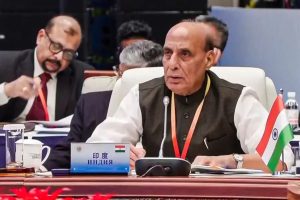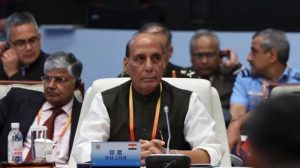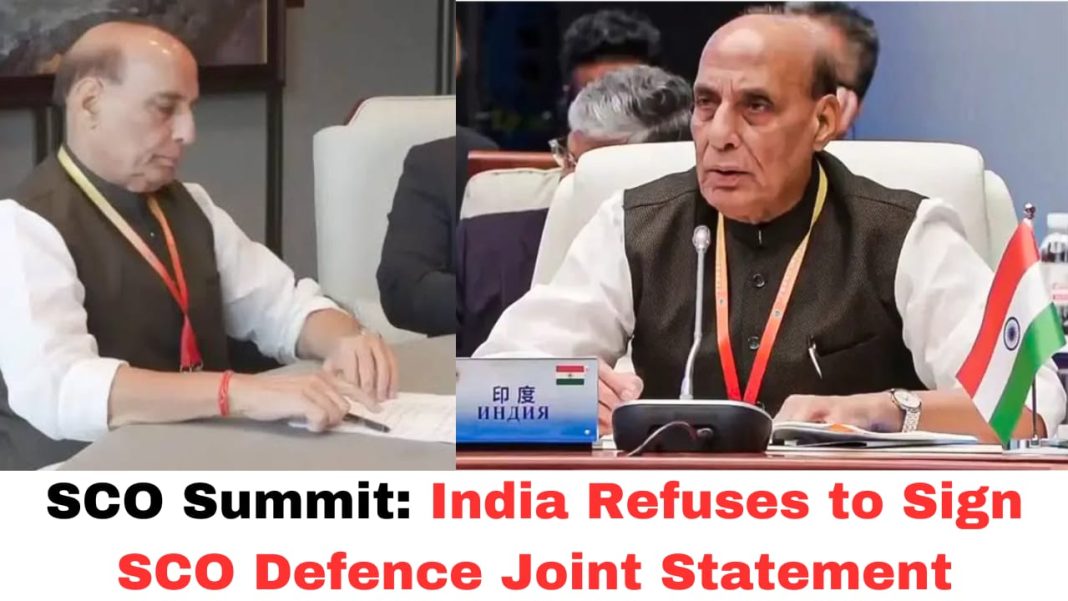Digital News Guru National Desk:
India Draws a Firm Line: Refusing to Sign SCO Defence Joint Declaration
At the Shanghai Cooperation Organisation (SCO) Defence Ministers’ Meeting held on June 25–26, 2025, in Qingdao, China, India took a decisive diplomatic stance by refusing to endorse the joint communiqué. Defence Minister Rajnath Singh declined to sign the document, citing its failure to address the April 22 Pahalgam terrorist attack—a massacre that claimed 26 lives, including a Nepali national. In contrast, the document reportedly mentioned militant activities in Pakistan’s Balochistan region.
This refusal underscores a low point for consensus-led diplomacy within the SCO—a bloc comprised of China, Russia, India, Pakistan, Iran, and Central Asian nations. The absence of a communique, a first for such a summit, highlights India’s unwillingness to compromise on counter‑terror narratives.

The Crux: Pahalgam Omitted, Balochistan Included
The draft statement reportedly included reference to the Jaffar Express attack in Balochistan—where Baloch separatists killed approximately 64 people—while deliberately omitting any mention of the Pahalgam incident. New Delhi interpreted this as a biased narrative that equated both countries as victims, glossing over Pakistan-linked terrorism in India. Government sources confirmed that China and Pakistan conspired to omit Pahalgam while spotlighting Pakistan’s casualties, prompting India’s red flag .
Rajnath Singh Launches a Diplomatic Offensive
During the summit, Rajnath Singh delivered a pointed address, warning against double standards in counter-terrorism. He stressed:
“There should be no place for such double standards. SCO should not hesitate to criticise such nations.”
He further highlighted that peace and prosperity cannot co‑exist with terrorism or WMD proliferation by non‑state actors, and urged SCO nations to hold perpetrators, sponsors, and financiers of terrorism accountable. The implication was clear: India’s policy of zero‑tolerance toward terrorism, including pre‑emptive military tactics like Operation Sindoor, had reshaped its global posture.
MEA: One Country Balked at Terror Language
In a press briefing, MEA spokesperson Randhir Jaiswal disclosed that India wanted references to terrorism and the Pahalgam attack in the document. However, those clauses were “not acceptable to one particular country,” widely understood to be Pakistan, supported by China. The lack of consensus barred the communiqué.
Pakistan’s Defensive Counter-Narrative
In contrast, Pakistan’s Defence Minister Khawaja Asif tweeted reaffirmations of Islamabad’s own anti‑terror stance, including a condemnation of the Pahalgam attack—with claims that Palestine, Iran, and even Lashkar-e-Taiba were involved. He excoriated India for alleged “state sponsorship” of terrorism in Balochistan and positioned Pakistan as a victim of biased narratives .
Though Pakistan verbally rebuked radicalism, the broader SCO document reportedly lacked firm language against terrorism as India demanded—a reflection of differing geopolitical agendas among members.
The Broader Backdrop: Operation Sindoor & Proxy Warfare
The standoff in Qingdao has to be viewed against the backdrop of escalating India‑Pakistan tension:
- On April 22, 2025, militants attacked tourists in Pahalgam. Responsibility was claimed by The Resistance Front, an offshoot of Lashkar-e-Taiba.
- India responded with Operation Sindoor in early May—air strikes and precision strikes on suspected terrorist camps in Pakistan-administered Kashmir and Pakistan’s Punjab.

While India hailed Sindoor as a “measured, calibrated” response, Pakistan condemned it as an escalation, sparking cross-border fire before a ceasefire was brokered on May 10 .
SCO Under Strain: Fault Lines Emerge
This diplomatic clash laid bare deeper fractures within the SCO:
- China’s role: As the 2025 chair of SCO, China’s apparent support for Pakistan’s narrative and resistance to India‑backed terrorism clauses suggests a tilt toward shielding Islamabad.
- Russia and Central Asia: Though not vocal, their silence signifies diplomatic restraint and a desire to avoid open confrontation.
- Iran’s position: Focused more on its regional narratives (e.g., Israel‑Iran tensions), Iran too avoided picking sides.
Consequently, the absence of consensus at the conference raises questions about SCO’s relevance in security cooperation.
Implications for India, Pakistan, and SCO Unity
- India sends a message: Overlooking terrorist attacks undermines credibility. India has signaled a willingness to break diplomatic lockstep to defend its interests.
- Pakistani and Chinese disquiet: The Pahalgam omission prompted India’s rejection of the communique—an embarrassment for both.
- SCO unity weakened: Consensus decision-making is hamstrung when geopolitical biases cloud security dialogue. This fracture may recur in future forums.
- Regional security impacts: Tensions over terrorism may derail joint SCO initiatives on counter‑radicalisation, WMD proliferation, cybersecurity, and even defence coordination.
What Lies Ahead?
- Future SCO forums: With leaders’ summit scheduled in autumn, India must decide whether to continue its rigid line or seek principles-based compromise.
- China–India dynamics: New Delhi’s stand adds a layer of mistrust in a bilateral relationship already strained by border standoffs.
- Diplomacy vs defence: India’s move underscores a strategic pivot where military actions—like Operation Sindoor—and diplomatic assertiveness become twin pillars of foreign policy.

Conclusion
India’s refusal to sign the SCO joint declaration at Qingdao is more than a diplomatic protest—it’s a declarative moment. By demanding explicit mention of terrorist incidents, especially Pahalgam, Defence Minister Rajnath Singh sought to protect India’s narrative in the face of what it perceives as Pakistani denialism supported by Beijing.
It signals a transformation: India is prepared to sacrifice multilateral solidarity for principled diplomacy on terrorism. For the SCO, this episode is a cautionary tale—true cohesion demands confronting uncomfortable truths, not glossing them over.
As global security landscapes evolve, Delhi’s insistence may reshape how the world views consensus in the SCO—and whether geopolitical convenience will continue to hold sway over hard realities.
You May Also Read: Vidya Balan Joins Raja Shivaji: A New Queen in Riteish’s Pan Indian Epic








